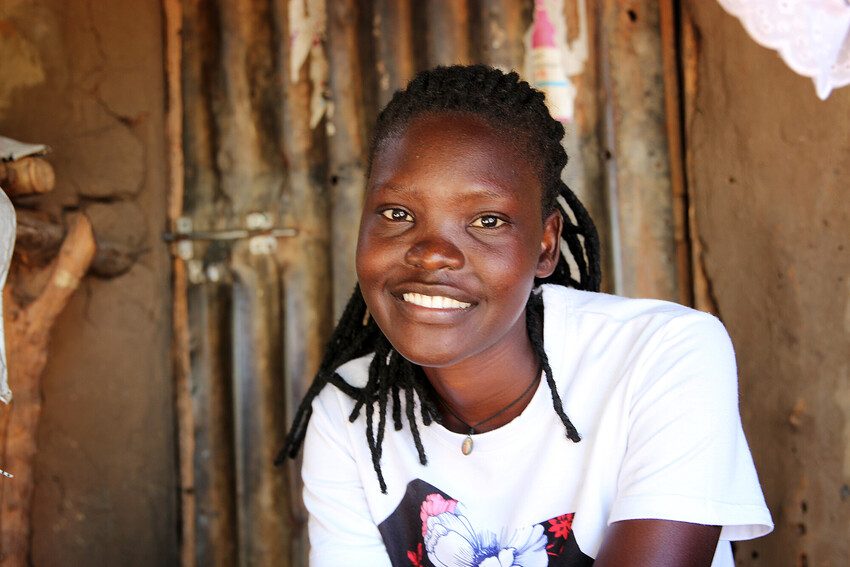How Ruth’s business supports her family
Ruth, a refugee from South Sudan, wanted to help her family, so she joined a business training programme. Today, she is the proud owner of a successful small business, selling charcoal, dried fish, tomatoes, scissors, padlocks and dresses – a real corner store.

Ruth didn’t want to drop out of school, but the 20-year-old refugee from South Sudan says she had no choice when she couldn’t afford the fees. “After I left school, I was at home, and life became very hard.”
I am now living happily. I’m shining and proud.
Ruth, 20, small business owner
The settlement where she lives, in the Adjumani district in the north of Uganda, is now home to some 15,000 people (including those who live in the host community). Uganda is the largest refugee host country in Africa. While it has a relatively progressive approach to refugee management, tensions exist among host communities, long-term refugees and new arrivals due to competition over decreasing resources and the actual or perceived belief of unequal access to services.
Business skills for a better life
Ruth has eight siblings, three of whom are already married due to the family’s economic situation. She wanted to help her family, so she joined a business training programme. Today, she is the proud owner of a successful small business, selling charcoal, dried fish, tomatoes, scissors, padlocks and dresses – a real corner store.
“I was able to borrow some money, and I started my business,” she explains. “When I started to make a profit, I repaid the money plus interest. I understand profit, loss and interest and other things that go into running a business.”
Her early success emboldened her to borrow more money to expand. “I thought to myself, ‘I am capable; I am strong,’” she says. Ruth has since repaid that loan, which makes her feel “happy and excited” that she can support her parents, buy food for the family and pay the school fees for her younger siblings. “I am now living happily. I’m shining and proud.”
Ruth credits her success to the mentors she met in the Youth Savings Group she joined. She hopes to also be a mentor one day. “I want others in my community to become empowered and move on with their lives,” she says.
“My next step is to continue growing my business. I may get my mom to run this one while I start another. I also want to help my younger siblings finish school, and maybe I’ll return to school to study social work and social administration, because I like counselling people.”
How we’re supporting girls in crisis
In the past year, the Adolescent Girls in Crisis (AGiC) project has supported 3,344 people, including 1,235 girls and 866 young women, across two refugee settlements in northern Uganda. Participants in 25 Youth Savings Groups study business skills such as record keeping, branding, market assessment and business planning. They also learn about their social and economic rights, which decreases their risks of gender-based violence and early and forced marriage.
The results? To date, 157 adolescent girls and young mothers are now engaged in their businesses, and 81% of them say that the training has helped them manage their finances.
The project also created four Adolescent Girls and Young Mothers (AGYM) safe spaces, where participants can access protection services. To date, 109 survivors of violence have accessed non-food items and have been referred for further support.
In addition, 41 health workers have been trained in adolescent-friendly services. This has helped 3,936 adolescents access sexual and reproductive health services.


